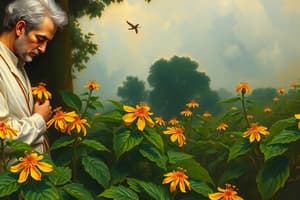Podcast
Questions and Answers
What was the initial plant extract Tu Youyou investigated for its potential to kill malaria-causing parasites?
What was the initial plant extract Tu Youyou investigated for its potential to kill malaria-causing parasites?
- Ginseng
- Artemisia annua (correct)
- Cinchona
- Quinine
Which novel compound did Tu Youyou isolate that was different from any other known antimalaria drug?
Which novel compound did Tu Youyou isolate that was different from any other known antimalaria drug?
- Dihydroartemisinin
- Chloroquine
- Artemisinin (correct)
- Mefloquine
What preparation method did Tu Youyou find essential to successfully extracting the active substance from qinghao?
What preparation method did Tu Youyou find essential to successfully extracting the active substance from qinghao?
- Decoction method by simmering
- High temperature boiling method
- Cold press extraction
- Low temperature method using water, ethanol, and ethyl ether (correct)
What critical activity did Tu Youyou undertake that contributed greatly to her successful isolation of artemisinin?
What critical activity did Tu Youyou undertake that contributed greatly to her successful isolation of artemisinin?
What role does artemisinin play in the treatment of malaria?
What role does artemisinin play in the treatment of malaria?
What was Tu Youyou's significant contribution recognized by the Nobel Prize in Physiology or Medicine in 2015?
What was Tu Youyou's significant contribution recognized by the Nobel Prize in Physiology or Medicine in 2015?
What was one result of Tu Youyou's redesign of her extraction experiment for artemisinin?
What was one result of Tu Youyou's redesign of her extraction experiment for artemisinin?
What did Tu Youyou primarily use to search for antimalarial herbs in traditional Chinese medicine?
What did Tu Youyou primarily use to search for antimalarial herbs in traditional Chinese medicine?
What is the name of the more potent derivative of artemisinin developed by Tu Youyou?
What is the name of the more potent derivative of artemisinin developed by Tu Youyou?
In what year did the Chinese Ministry of Health recognize dihydroartemisinin as a significant antimalarial compound?
In what year did the Chinese Ministry of Health recognize dihydroartemisinin as a significant antimalarial compound?
Flashcards
Tu Youyou
Tu Youyou
A scientist who discovered artemisinin, an anti-malarial drug.
Artemisinin
Artemisinin
The active compound discovered by Tu Youyou, used to treat malaria.
Decoction method
Decoction method
A technique involving simmering plant roots to extract compounds.
Dihydroartemisinin
Dihydroartemisinin
Signup and view all the flashcards
Clinical trials
Clinical trials
Signup and view all the flashcards
Ge Hong
Ge Hong
Signup and view all the flashcards
Plasmodium
Plasmodium
Signup and view all the flashcards
Lasker Award
Lasker Award
Signup and view all the flashcards
Nobel Prize in Medicine
Nobel Prize in Medicine
Signup and view all the flashcards
Combination therapy
Combination therapy
Signup and view all the flashcards
Study Notes
Tu Youyou's Research on Artemisinin
- Tu Youyou, a Chinese scientist, researched herbal remedies for malaria treatment.
- She tested 380 extracts from 200 plants for their ability to kill malaria-causing Plasmodium parasites in mice.
- An extract from Artemisia annua (sweet wormwood) initially showed promise, but results were inconsistent.
- A new preparation technique, a Chinese decoction method, was employed.
- Instead of simmering the roots, she extracted active ingredients from the leaves and stems using a low-temperature method that included water, ethanol, and ethyl ether.
- This method effectively isolated the active compound artemisinin.
- Artemisinin successfully treated malaria in mice by damaging the parasite's membranes and interfering with hemoglobin digestion.
- Artemisinin is a sesquiterpene lactone (a unique type of compound) unlike any known antimalarial drug.
Further Success and Recognition
- Clinical trials on humans were conducted to validate artemisinin's effectiveness.
- In 1972, Tu Youyou and colleagues began human trials.
- A second compound, dihydroartemisinin, was developed. It was ten times more potent (meaning a smaller dose gave the same effect).
- This more potent compound, along with artemisinin, was licensed for use in 1986 and by the Chinese Ministry of Health in 1992.
- Her research contributed to fast-acting artemisinin-based drug combinations for malaria.
- The combination treatments saved and/improved the health of 198 million.
- Her work with artemisinin earned her the Nobel Prize in Physiology or Medicine in 2015, shared with Satoshi Omura and William Campbell. (first Chinese woman and first Chinese person to win this Nobel Prize.)
- Tu Youyou, as chief scientist at the China Academy of Traditional Chinese Medicine, continues her work.
Relevant Information
- Scientists Worldwide tested over 240,000 compounds before artemisinin's discovery.
- Satoshi Omura used natural sources to create antiparasitic medicines, specifically ivermectin.
- Ge Hong's Handbook for Prescriptions (1600 years old) was consulted as a reference for the extraction process.
Studying That Suits You
Use AI to generate personalized quizzes and flashcards to suit your learning preferences.





